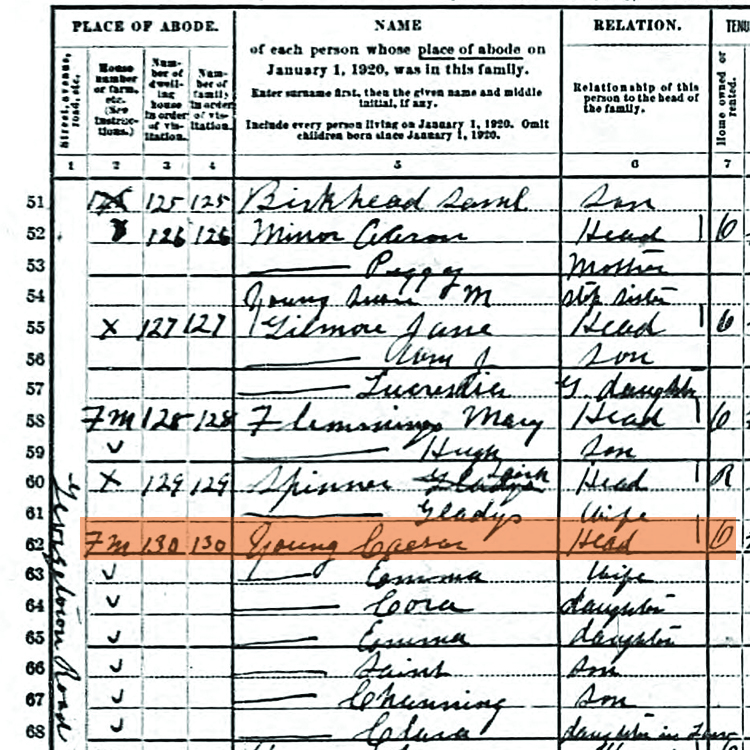Caesar Young was enslaved by the Duke Family at Sunnyside. Following the Civil War, Young continued to work for the Duke Family as a gardener and barbeque pit master on the site of the modern-day Law School. He rose to local fame for his barbeque, feeding UVA alumni for decades during reunion weekends.
Caesar Young was born into slavery around 1854 to a woman named Maria, enslaved by R.T.W. Duke Sr. of Charlottesville.[1] Maria labored as a housemaid for the Duke family. [2] According to Maria, Caesar’s father was John Yates Beal, a student at the University who was later hanged in New York City as a Confederate spy.[3] Between 1858 and 1859, Duke Sr. sold Maria on grounds that she had become "so bad."[5] Maria later wrote to the Duke family inquiring about Young.[6]
Young was eventually enslaved by Duke Jr., although it is unclear when this transaction from father to son took place. In his “Recollections,” Duke Jr. claimed, “Caesar was given to me—the only human chattel I ever owned.”[7] Young was one year older than Duke Jr., and served as his playmate throughout his childhood at Sunnyside.
As children, Young and Duke Jr. also played with Duke Jr.’s siblings, the children of Mr. Anderson (the overseer of the Albemarle Poor House, at Sunnyside), and a boy whom Mr. Anderson enslaved named Tom.[9] Duke Jr.’s multiple anecdotes of their childhood games, provide a glimpse, albeit biased and exclusive to Duke Jr., into Caesar’s treatment at Sunnyside. Caesar and Duke Jr. often fought as children—“the roll and tumble fights of small boys”— and Caesar was “never punished for ‘striking back.’” However, he was “never allowed to be impudent or to strike the first blow.”[8] No written record exists of Young’s thoughts on his enslavement.
When the Union Army arrived in Charlottesville on March 3, 1865, Duke Jr. and Young were about ten years old. They heard the “martial music” coming from University Road, likely present-day Ivy Road.[15] Young, Duke Jr., Jane (the enslaved cook), and an unnamed enslaved person ran from Sunnyside to a hill overlooking the road to watch. Duke Jr. recalled that “a long blue line of horsemen filled it as far as we could see.”[16]
At the war's end, Young remained at Sunnyside and worked for the Duke family for wages. It is possible Caesar worked for Duke Jr. when Duke enrolled at the University of Virginia in 1870. From 1888 to 1898, Duke Jr. recalled that Young also worked as R.T.W. Duke’s gardener at Sunnyside. By Duke Sr.’s death in 1898, Caesar was the only “old family servant with us.”[19]
Between 1873 and 1876, Duke Sr. revitalized the traditional Virginia barbeque in the area by forming the Cold Spring Barbeque Club.[18] The club was comprised of dozens of prominent white men in the area, including Duke Jr., and its frequent meetings took place at a designated pit on Sunnyside property. Formerly enslaved men and women worked as chefs, preparing Brunswick stew and barbequed lamb and pig as was done before the Civil War. At some point, Young must have learned how to barbeque under these chefs, because he later became known as a master of the craft. In 1921, during UVA’s Centennial Celebration, Young was one of the head chefs at the Centennial barbeque behind the modern-day McCormick Road dormitories.[20]
In 1920, Young lived on Georgetown Road in Albemarle County, a common place for freed Black people to settle in the Charlottesville area after the Civil War. He was married to a woman named Emma Young and had five children: Saint (34), Channing (21), Clara (21), Cora (16), and Emma (13).[21]
Ten years later, Young was 75 and lived with his son, Saint.[22] He died in 1935 on Christmas Eve at age 81.[23] Before Young’s death, Duke Jr. wrote of his legacy, “when Caesar goes, as far as Albemarle is concerned the ‘barbeque’ will practically go out of existence.”[24]
Sources
[1] Most information on Caesar Young’s life comes from Col. Richard Thomas Walker Duke, Jr.’s Recollections (hereafter cited as Recollections, Volume:Page).
[2] Recollections, 1:21.
[3] Ibid.
[4] Ibid.
[5] Ibid., 1:22.
[6] Ibid.
[7] Ibid.
[8] Ibid., 1:23.
[9] Ibid., 1:135.
[10] Ibid., 1:139.
[11] Ibid., 1:207.
[12] Ibid., 1:165.
[14] Ibid., 1:154.
[15] Ibid.
[16] Ibid., 1:214.
[17] Papers of R.T.W. Duke 1836-1919, Albert and Shirley Small Special Collections Library.
[18] Recollections, 3:157.
[19] Ibid., 1:24.
[20] “Barbeque Specialists Prepare for Big Centennial Event,” University of Virginia Alumni News, April 1921.
[21] 1920 Federal Census, https://search.ancestry.com/cgi-bin/sse.dll?indiv=1&dbid=6061&h=22985806&tid=&pid=&queryId=af32759906eaaf37ddc8afa688809eb1&usePUB=true&_phsrc=NEX481&_phstart=successSource
[22] 1930 Federal Census, https://search.ancestry.com/cgi-bin/sse.dll?dbid=6224&h=97159816&indiv=try&o_vc=Record:OtherRecord&rhSource=6061.
[23] Joseph R. Hayne’s Virginia Barbeque: A History (The History Press: 2016), pp. 172-174.
[24] Recollections, 4:4.

